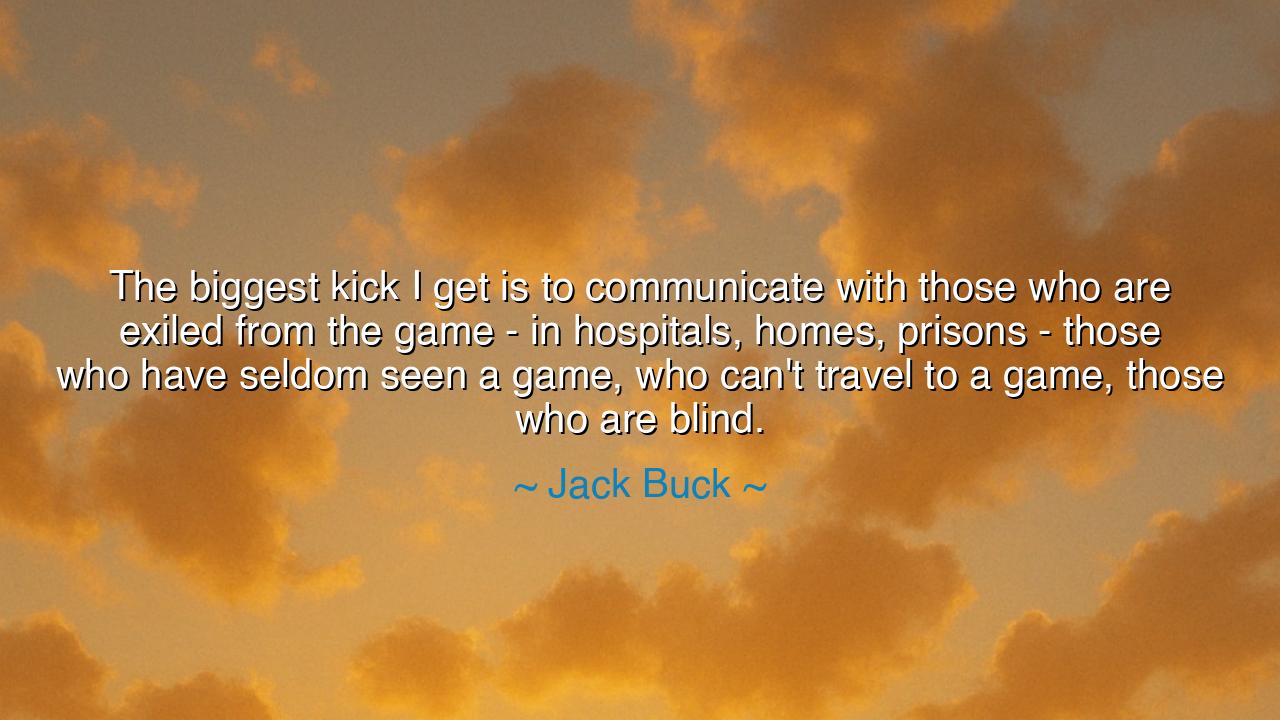
The biggest kick I get is to communicate with those who are
The biggest kick I get is to communicate with those who are exiled from the game - in hospitals, homes, prisons - those who have seldom seen a game, who can't travel to a game, those who are blind.






Jack Buck, the voice of baseball and the companion of millions who could not see the game with their own eyes, once said: “The biggest kick I get is to communicate with those who are exiled from the game—in hospitals, homes, prisons—those who have seldom seen a game, who can’t travel to a game, those who are blind.” These words, though spoken about sport, carry a truth far greater than baseball: that the greatest joy in life is not found in speaking to the crowd, but in reaching the hearts of the forgotten. To bring the game to the exiled, to those who cannot sit in the stands or watch the field, is to lift them beyond their walls and allow them to touch the beauty of something larger than themselves.
The origin of this quote lies in Buck’s role as a broadcaster, a man whose voice painted vivid pictures of the diamond for those who could not see or attend. For the healthy and free, the game was an outing, an entertainment, a pastime. But for those bound by sickness, confinement, or blindness, the game lived only through sound. Buck knew that his words were not merely commentary, but wings—lifting the lonely from their isolation and carrying them into the roar of the crowd, the crack of the bat, the glory of the field. His greatest joy, then, was not in fame, but in connection.
The ancients, too, honored those who brought stories to the shut-in and light to the blind. The rhapsodes of Greece, who recited Homer’s tales to audiences who could not read, gave to the common man the same access to epic glory as the nobles who owned the scrolls. These storytellers carried their listeners into battles at Troy, into the wanderings of Odysseus, into the presence of gods and heroes. So too did Jack Buck, in his own way, take those bound by beds, cells, or shadows and carry them into the living drama of the ballpark.
Consider the story of Helen Keller, who, though blind and deaf, found liberation in the touch of her teacher’s hand and the discovery of language. To her, communication was a lifeline, the bridge from exile to belonging. Buck’s joy in narrating the game for the blind was of the same spirit: to restore dignity, to remind the forgotten that they too were part of the living world. In doing so, he proved that the true measure of greatness is how much we bring others into joy, not how much we keep it for ourselves.
There is a quiet heroism in his words. Many seek the applause of the crowd, but Buck sought the gratitude of the voiceless. He knew that a man in prison, hearing the game through his radio, could for a moment forget his chains. He knew that a child in a hospital bed, hearing the roar of a home run, could for a moment forget her pain. He knew that the blind, through the richness of description, could stand on the same ground as those with sight. This was his calling, his “biggest kick”—to give the gift of inclusion where the world had excluded.
The lesson is luminous: seek joy not in what you gain, but in what you give. The world is full of exiles—those shut away by circumstance, by illness, by misfortune. To remember them, to reach them, to bring them light and connection, is the truest act of humanity. Fame fades, victories are forgotten, but the kindness given to the forgotten endures in eternity.
Practically, this means we must look around us for those who cannot “travel to the game”—those who cannot join the celebrations of life. It may be the elderly neighbor, the prisoner seeking a letter, the sick friend in need of a call, the blind soul who longs for description of beauty. In reaching them, we give them a share in life’s joys, and in doing so, we discover our own greatest joy.
Thus, Jack Buck’s words, born from the humble heart of a broadcaster, stand as a teaching to future generations: true greatness is found in lifting the exiled into belonging. When we use our voices, our gifts, our presence to bring joy to those who cannot reach it themselves, we too become voices of hope, storytellers of light, and companions to the forgotten.






AAdministratorAdministrator
Welcome, honored guests. Please leave a comment, we will respond soon